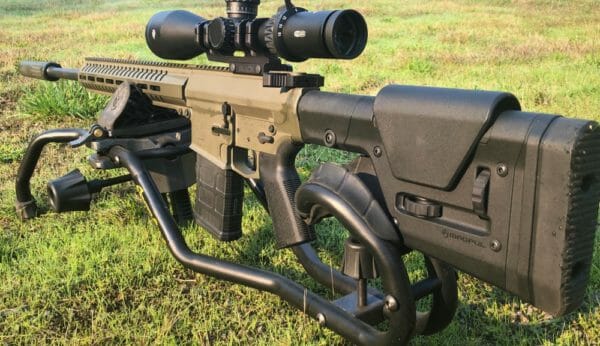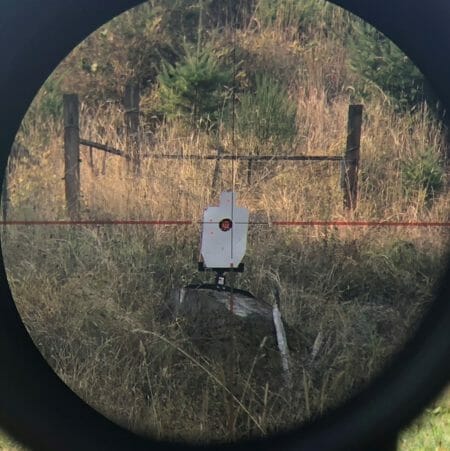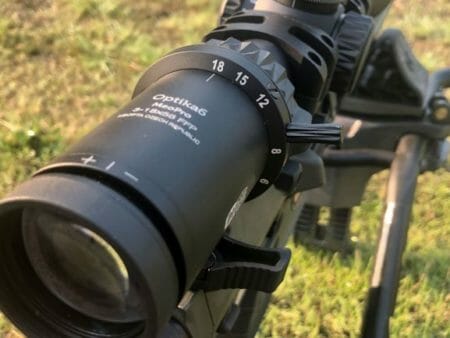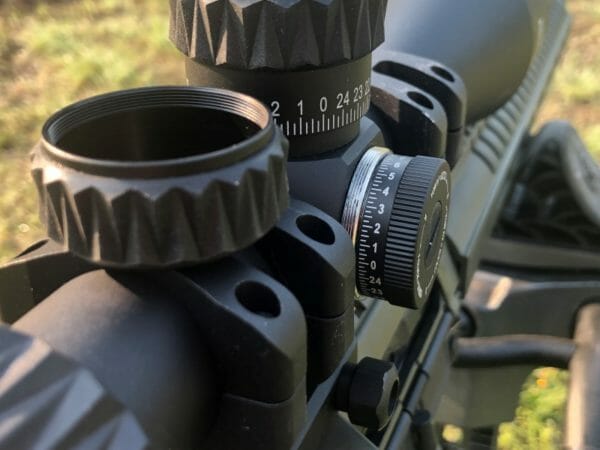Rex reviews the Meopta Optika 6 Riflescope with its DicroTech optic reticle.

U.S.A. –-(AmmoLand.com)- Meopta has been manufacturing optics out of Czechoslovakia for nearly 90 years now. Despite such a wealth of experience, the US market seems to have had a blind spot on the brand. Meopta has largely built its products for militaries around the globe or has acted as a manufacturing partner, allowing other companies to stamp their brand on a Meopta-made product. Within the last 7 years, that has started to change. Now, Meopta is hard-charging at the US market, with numerous awards and accolades to herald their success. This is my first time with the brand, however, so past awards don’t mean much when it’s a new product in my hands. Here it is, the Meopta Optika6 scope.
Meopta Optika 6 Riflescope

Before we dive in, let’s tale a look at the tech specs, as provided by Meopta.
- Magnification: 3-18x
- Objective lens: 56mm
- Main tube: 30mm
- Eye relief: 3.94″
- FOV: 33.3’@100 yards
- Focal plane: FFP
- Turret adjustments: 1/4 MOA
- Length: 14.5′
- Weight: 30.5 oz
- Windage and Elevation Adjustment Range: 90 MOA

It took me a minute to get used to the DicroTech reticle. Not because it was hard to use, but because it was so natural. I transitioned back and forth on a few targets between 50 and 300 yards. Some were paper, some were trees, others were rocks. The reticle changed smoothly between varying shades of red and near-black, instantly. No detail was lost behind the stadia, vertical or horizontal. This made a huge difference at maximum magnification!

Besides the DicroTech, the reticle in the model I tested was pretty plain fare. Many other reticles are available, both BDC and MIL/MOA based hash reticles. The 4D Dichro reticle is thick stadia with fine crosshairs, no other holdover marks. This works really well as a short-to-medium distance reticle, where speed is more of a priority than tracking holdovers for an extreme vertical drop.
After inspection, I mounted the Optika6 onto my CMMG Endeavor 300 in 6.5 Creedmoor. This is a beast of a rifle, both in terms of size and capability. This particular rifle is wonderfully accurate, and the cartridge itself has great performance with moderate mass, great muzzle velocity and a ballistic coefficient (BC) that is the envy of many other intermediate cartridges. I know the ammo and the rifle are solid performers, so if there’s any issue it’s with the “new guy” on the bench.
I’m lucky enough to live in a place where I can shoot safely within the confines of my own property, even out to near 300 yards. This makes taking a product out for a half dozen quick shooting sessions a breeze, instead of one massive and laborious range trip. After a number of times popping out to the pasture/range, I can say that the Optika6 has me wanting more. Not more quality or more features, but rather more time shooting with it!
The turrets on the Optika6 are excellent. Sharp clicks with no “mush”. These check the boxes of being both audible and tactile. Further, the Optika6 passed the first “box test”, where I shoot at a point, adjust 10 left, shoot, adjust 10 down, shoot, adjust 10 right, shoot, then adjust 10 up back to the starting point. After you shoot again, the point of impact should be back to the starting shot. This shows that the turrets track well and maintain repeatability. The top turret (elevation) is exposed, and lift-to-unlock. The side turret (windage) is under a cap, then free to spin with no lock. I’d have preferred to see both the same. The top turret is plenty secure, and if we’re dialing adjustments instead of using holdovers I’d like to have both easily available.

There’s a reason Meopta is famous in Europe. Their glass is legendary, but I needed to see it for myself I suppose. Whether in the morning (just after the kids head to school), or at dusk (when the bucks come looking for plums on the ground), this optic performs. Meopta is making a big push into the US civilain market, and with products like this, I think it’s only a matter of time before they make further inroads to those shooters who don’t mind foreign products and long as they’re not cheap junk posing as quality. The Optika6 comes with a lot of options. A number of reticles are available, as well as your choice of FFP or SFP.
Street prices range from $559 to $799 right now, and if you’re looking to try a new optic that has a history of quality behind it, the Meopta Optika6 is a great place to start. Check it out!
About Rex Nanorum
Rex Nanorum is an Alaskan Expatriate living in Oregon with his wife and kids. Growing up on commercial fishing vessels, he found his next adventure with the 2nd Bn, 75th Ranger Regt. After 5 tours to Afghanistan and Iraq, he adventured about the west coast becoming a commercial fisheries and salvage SCUBA diver, rated helicopter pilot instructor (CFII) and personal trainer, before becoming a gear reviewer and writer.”

